英语外研版九年级上册语法
【外研版】九年级英语上册[单词短语句型]全汇总
![【外研版】九年级英语上册[单词短语句型]全汇总](https://img.taocdn.com/s3/m/0680ad4dc281e53a5902ff27.png)
【外研版】初三上学期英语Module 1 Wonders of the world短语归纳1.wonders ofthe world世界奇观natural wonders 自然奇观 man-made wonders人造奇观2.join in参加;加入 (活动) = take part in3. I’m notsure. 我不确信4. agreewith sb. 同意某人的看法 sb. agree with sth. 某人适应(食物、气候)agree to do sth. 同意做某事 agree to sth.(plan /decision/suggestion) 同意/赞成agree on sth.( plan/ ) 在……方面意见一致5. on theeastern coast of ...在、、、、、、的东海岸6. in one’sopinion据某人看来;按某人的意见7. more than= over 多于,超过8. produce electricity 供电9. millionsof 数百万的;数以百万计的10. wouldlike to do sth. = want to do sth. 想做某事Would like sb. to do sth. 想要某人做某事11. earlymorning 大清早 12. become grey变成灰色13. get outof ...从....出来14. gothrough 意为“穿过,强调从物体内部穿过”;从头至尾的练习15. fallaway突然向下倾斜16. lookover 从(某物上面)看过去:仔细检查look across眺望look down to 俯视;向下看17. on topof 在.....顶部 18. at the bottom of在.....的底部19. on bothsides在两边 20. be famous for意为“以.......而闻名”21. do aninterview做采访 do an interview withsb. 采访某人22. draw apicture of 画一副......的图画 23. go down下去;下沉;坠落24. wait for等候 25. dozens of 许多26. inheight高度;在高度上用法集萃1. agree with sb 同意某人 agree to dosth 同意做某事2. would like to do sth 想要做某事3. in +一段时间在.....(多长时间)之后,常用于回答How soon 的提问4. havebeen/gone to 以及have been in的区别5. because of+名词因为。
外研版初中九年级上册英语 Module 9 知识点总结
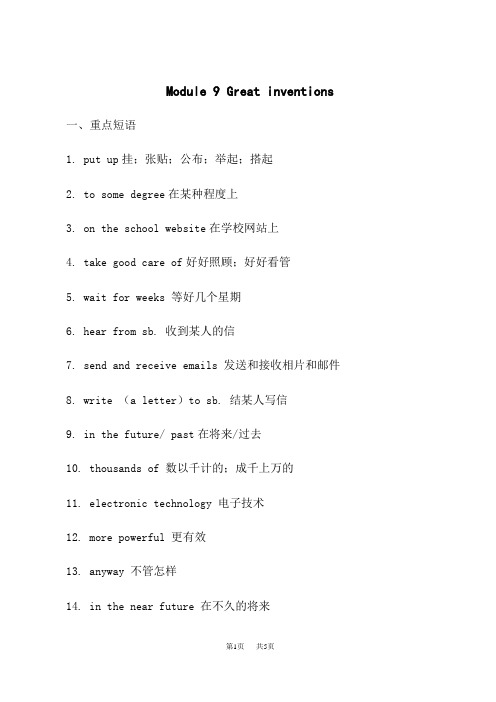
Module 9 Great inventions一、重点短语1. put up挂;张贴;公布;举起;搭起2. to some degree在某种程度上3. on the school website在学校网站上4. take good care of好好照顾;好好看管5. wait for weeks 等好几个星期6. hear from sb. 收到某人的信7. send and receive emails 发送和接收相片和邮件8. write (a letter)to sb. 结某人写信9. in the future/ past在将来/过去10. thousands of 数以千计的;成千上万的11. electronic technology 电子技术12. more powerful 更有效13. anyway 不管怎样14. in the near future 在不久的将来15. instead of doing sth. 代替做某事16. borrow sth. from sb. /sp. 从某人/某地借某物17. lend sth. to sb. 把某物借给某人18. as a result of 由于;因为19. communicate with 与……联系(交流)20. be replaced by被......取代21. look through 快速阅读;浏览22. go to sleep 入睡;睡着23. in those days 在那个年代24. at a time 每次;一次25. by hand 用手(工);靠手做26. as a result 结果;因此27. promise sb. to do sth. 承诺某人做某事28. keep away from 远离29. in a way从某一点上看;在某种程度上30. compare …to…把…比作/看作31. search for搜寻;搜查32. all kinds of 各种各样的33. wait and see 等等看;等着瞧34. give/make a report 做报告35. hundreds of millions of +复数名词数亿的....36. do research 做调查二、固定结构make sb. /sth. + adj. 使某人/某物处于某种状态not all…并非所有的……都(部分否定)what’s more 而且,更重要的是I wonder = I want to know 我想知道an amount of + 不可数名词大量的an empty memory card 一张空白的存储卡in the+序数词+century 在......世纪三.重点句型:1. It’s +形容词+to do sth.做某事是....的 It`s easy to study English well.学英语容易。
(完整word版)外研版九年级英语上册语法知识点汇总.docx
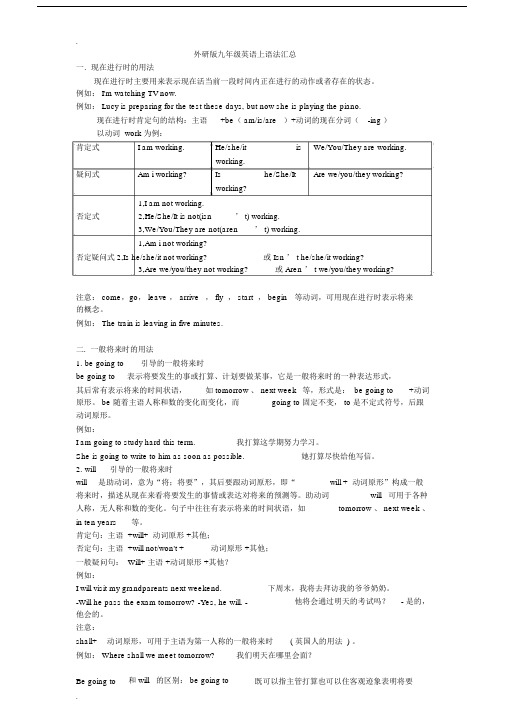
.外研版九年级英语上语法汇总一.现在进行时的用法现在进行时主要用来表示现在活当前一段时间内正在进行的动作或者存在的状态。
例如: I'm watching TV now.例如: Lucy is preparing for the test these days, but now she is playing the piano.现在进行时肯定句的结构:主语+be( am/is/are)+动词的现在分词(-ing )以动词 work 为例:肯定式I am working.He/she/it is We/You/They are working.working.疑问式Am i working?Is he/She/It Are we/you/they working?working?1,I am not working.否定式2,He/She/It is not(isn’ t) working.3,We/You/They are not(aren’ t) working.1,Am i not working?否定疑问式2,Is he/she/it not working?或 Isn ’ t he/she/it working?3,Are we/you/they not working?或 Aren ’ t we/you/they working?注意: come,go, leave , arrive, fly, start , begin等动词,可用现在进行时表示将来的概念。
例如: The train is leaving in five minutes.二. 一般将来时的用法1. be going to引导的一般将来时be going to表示将要发生的事或打算、计划要做某事,它是一般将来时的一种表达形式,其后常有表示将来的时间状语,如 tomorrow 、 next week等,形式是: be going to+动词原形。
外研版九年级英语上册语法复习课件 Module7

单项选择
( A ) 1. ----Why not buy a radio and learn English on the radio?
----______________
A. Sounds like a good idea!
B. It doesn't matter.
C. Thanks for your help.
-----Wonderful. We were all_________with the __________trip.
A. pleased;pleasant
B. pleasant;pleased
C. pleasing;pleased
D. pleasant;pleasing
( B ) 5. Now people's __________life is becoming better and better.
have/has +been done
主动语态和被动语态的比较
时态 主动语态
被动语态
过去将来 时
过去完成 时 情态动词
Was/were + going to do
Would + do
had+ done
can/must...+do
Was/were + going to be done Would +be +done had+ been +done
❖ 2.Linda’s parents make her practice the piano every Sunday. Linda is made to practice the piano every Sunday.
外研版九年级上册英语语法总结
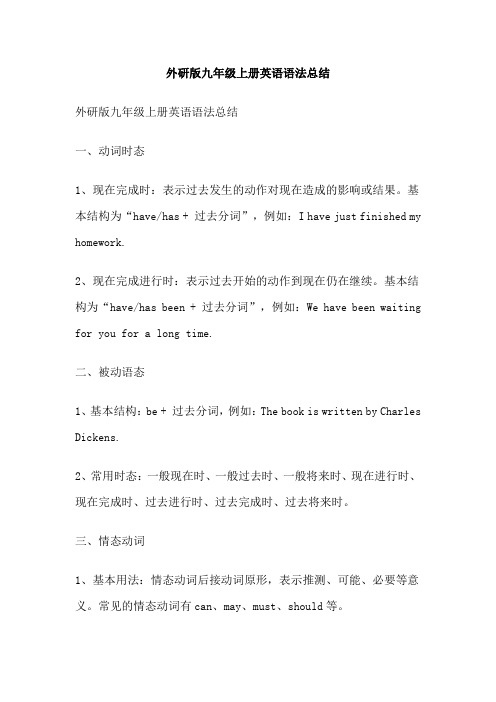
外研版九年级上册英语语法总结外研版九年级上册英语语法总结一、动词时态1、现在完成时:表示过去发生的动作对现在造成的影响或结果。
基本结构为“have/has + 过去分词”,例如:I have just finished my homework.2、现在完成进行时:表示过去开始的动作到现在仍在继续。
基本结构为“have/has been + 过去分词”,例如:We have been waiting for you for a long time.二、被动语态1、基本结构:be + 过去分词,例如:The book is written by Charles Dickens.2、常用时态:一般现在时、一般过去时、一般将来时、现在进行时、现在完成时、过去进行时、过去完成时、过去将来时。
三、情态动词1、基本用法:情态动词后接动词原形,表示推测、可能、必要等意义。
常见的情态动词有can、may、must、should等。
2、特殊用法:情态动词后接“have + 过去分词”,表示推测、可能、必要等意义。
例如:You must have misunderstood me.四、定语从句1、基本用法:在句子中,定语从句用来修饰主语、宾语或表语。
引导定语从句的有that、which、who等。
2、难点解析:如何判断定语从句的引导词,根据定语从句与先行词的关系以及定语从句在句子中的作用来决定。
五、状语从句1、时间状语从句:用来表达动作发生的时间,例如:When the sun sets,we will go home.2、条件状语从句:用来表达某个条件下的结果,例如:If it rains tomorrow,we will stay at home.3、原因状语从句:用来表达原因或理由,例如:Because he was late,he missed the train.六、名词性从句1、主语从句:在句子中作主语,例如:What they need is more time.2、宾语从句:在句子中作宾语,例如:He told me that he would comeback soon.3、表语从句:在句子中作表语,例如:The reason why he left is unclear.以上是外研版九年级上册英语语法的主要内容,同学们在学习过程中要注意理解语法规则的基本含义和用法,多加练习,提高自己的英语语言能力。
最新外研版英语九年级上册知识点总结(精华版)

最新外研版英语九年级上册知识点总结(精华版)邓华Module1 Wonders of the world一、重点短语1.wonders of the world世界奇观2.natural wonders自然奇观3.join in = take part in参加;加入(活动)4.agree with sb.同意某人的看法5. agree to do sth.同意做某事6.in one’s opinion依某人看来;按某人的意见7.more than = over多于,超过8. millions of数百万的;数以百万计的9.produce electricity供电10.would like to do sth. = want to do sth.想做某事11.get out of...从....出来12.become grey变成灰色13.look across眺望, 向对面看14.look down to俯视;向下看15.go down下去;下沉;坠落16.look over从(某物上面)看过去:仔细检查17. go through穿过,经历,经受,浏览18.at the bottom of在.....的底部19.on both sides在两边20.in height高度;在高度上21. do an interview with sb.采访某人22.draw a picture of画一副......的图画23.fall away突然向下倾斜24.wait for等候25.dozens of许多26.be famous for以.......而闻名二、固定结构1. sb./sth agrees with sth.某人/某物适应(食物、气候)/符合某物,I don't think the food here agrees with me. 我觉得这里的食物不对我的胃口His explanation agrees with the facts of the situation.他的解释与实情相符。
外研版九年级英语语法整理
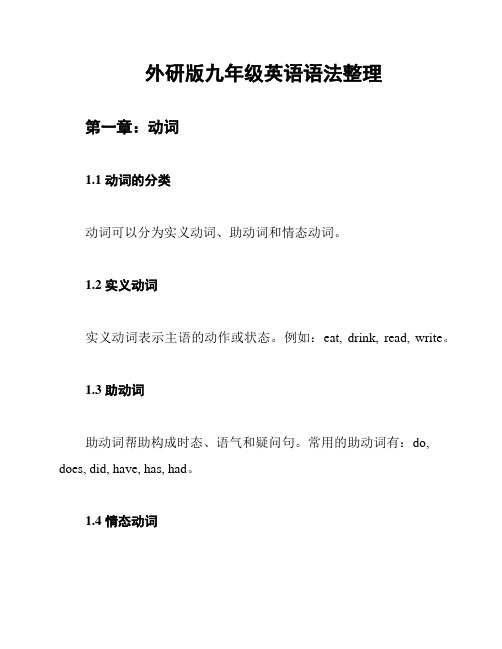
外研版九年级英语语法整理第一章:动词1.1 动词的分类动词可以分为实义动词、助动词和情态动词。
1.2 实义动词实义动词表示主语的动作或状态。
例如:eat, drink, read, write。
1.3 助动词助动词帮助构成时态、语气和疑问句。
常用的助动词有:do, does, did, have, has, had。
1.4 情态动词情态动词表示可能性、能力、建议、命令等。
常用的情态动词有:can, may, must, shall, will。
1.5 动词的时态动词的时态表示动作发生的时间。
常用的时态有:现在时、过去时、将来时。
1.6 动词的语态动词的语态表示主语与动作的关系。
常用的语态有:主动语态、被动语态。
第二章:名词2.1 名词的分类名词可以分为可数名词和不可数名词。
2.2 可数名词可数名词表示可以数的事物。
例如:boy, girl, book, pen。
2.3 不可数名词不可数名词表示不能数的事物。
例如:water, air, rice。
2.4 名词的所有格名词的所有格表示名词所表示的人或事物所属的关系。
例如:my book, the boy's pen。
第三章:形容词和副词3.1 形容词形容词用来修饰名词,表示名词的性质、状态等。
例如:big, tall, happy。
3.2 副词副词用来修饰动词、形容词或其他副词,表示程度、时间、地点等。
例如:quickly, happily, always。
3.3 形容词和副词的比较级和最高级形容词和副词的比较级和最高级表示程度的大小。
第四章:代词4.1 代词的分类代词可以分为人称代词、物主代词、反身代词、指示代词、疑问代词和关系代词。
4.2 人称代词人称代词表示人的称呼。
例如:I, you, he, she, it, we, they。
4.3 物主代词物主代词表示所有关系。
例如:my, your, his, her, its, our, their。
外研版九年级上册英语module 1 词汇与语法 初三
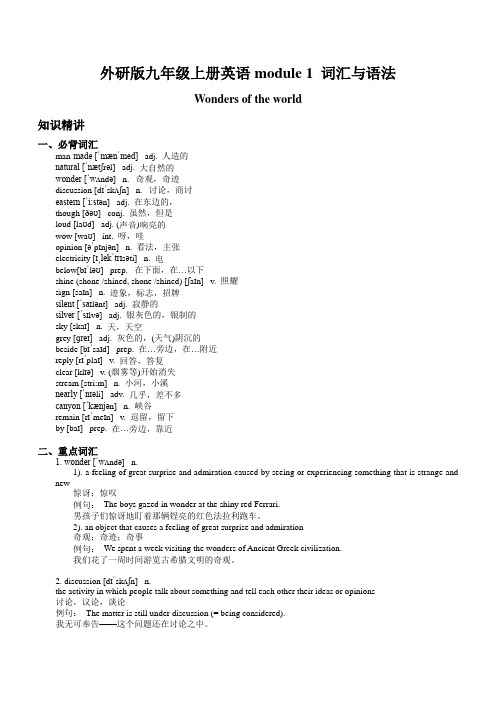
外研版九年级上册英语module 1 词汇与语法Wonders of the world知识精讲一、必背词汇man-made [ˈmænˈmed]adj. 人造的natural [ˈnætʃrəl] adj. 大自然的wonder [ˈwʌndə] n. 奇观,奇迹discussion [dɪˈskʌʃn] n. 讨论,商讨eastern [ˈi:stən] adj. 在东边的,though [ðəʊ] conj. 虽然,但是loud [laʊd] adj. (声音)响亮的wow [waʊ] int. 呀,哇opinion [əˈpɪnjən] n. 看法,主张electricity [ɪˌlekˈtrɪsəti] n. 电below[bɪˈləʊ] prep. 在下面,在…以下shine (shone /shined, shone /shined) [ʃaɪn] v. 照耀sign [saɪn] n. 迹象,标志,招牌silent [ˈsaɪlənt] adj. 寂静的silver [ˈsɪlvə] adj. 银灰色的,银制的sky [skaɪ] n. 天,天空grey [ɡreɪ]adj. 灰色的,(天气)阴沉的beside [bɪˈsaɪd] prep. 在…旁边,在…附近reply [rɪˈplaɪ] v. 回答,答复clear [klɪə] v. (烟雾等)开始消失stream [stri:m] n. 小河,小溪nearly [ˈnɪəli] adv. 几乎,差不多canyon [ˈkænjən] n. 峡谷remain [rɪˈmeɪn] v. 逗留,留下by [baɪ] prep. 在…旁边,靠近二、重点词汇1. wonder [ˈwʌndə] n.1). a feeling of great surprise and admiration caused by seeing or experiencing something that is strange andnew惊讶;惊叹例句:The boys gazed in wonder at the shiny red Ferrari.男孩子们惊讶地盯着那辆锃亮的红色法拉利跑车。
(完整版)外研版英语九年级上册知识点总结

外研版英语九年级上册知识点总结Module 1 Wonders of the world短语归纳1.wonders of the world世界奇观natural wonders 自然奇观man-made wonders 人造奇观2.join in参加;加入(活动) = take part in3. I’m not sure. 我不确信4. agree with sb. 同意某人的看法sb. agree with sth. 某人适应(食物、气候)agree to do sth. 同意做某事agree to sth.(plan /decision/suggestion) 同意/赞成agree on sth.( plan/ ) 在……方面意见一致5. on the eastern coast of ...在、、、、、、的东海岸6. in one’s opinion据某人看来;按某人的意见7. more than = over 多于,超过8. produce electricity 供电9. millions of 数百万的;数以百万计的10. would like to do sth. = want to do sth. 想做某事Would like sb. to do sth. 想要某人做某事11. early morning 大清早12. become grey变成灰色13. get out of ...从....出来14. go through 意为“穿过,强调从物体内部穿过”;从头至尾的练习15. fall away突然向下倾斜16. look over 从(某物上面)看过去:仔细检查look across眺望look down to 俯视;向下看17. on top of 在.....顶部18. at the bottom of在.....的底部19. on both sides在两边20. be famous for意为“以.......而闻名”21. do an interview做采访do an interview with sb. 采访某人22. draw a picture of 画一副......的图画23. go down下去;下沉;坠落24. wait for 等候25. dozens of 许多26. in height高度;在高度上用法集萃1.agree with sb 同意某人agree to do sth 同意做某事2.would like to do sth 想要做某事3.in +一段时间在.....(多长时间)之后,常用于回答How soon 的提问4.have been/gone to 以及have been in的区别5.because of+名词因为。
外研版英语九年级上册知识点总结(精华版)

九年级英语上册知识点总结Module1 Wonders of the world一、重点短语1.wonders of the world世界奇观2.natural wonders自然奇观3.join in = take part in参加;加入(活动)4.agree with sb.同意某人的看法5. agree to do sth.同意做某事6.in one’s opinion依某人看来;按某人的意见7.more than = over多于,超过8. millions of数百万的;数以百万计的9.produce electricity供电10.would like to do sth. = want to do sth.想做某事11.get out of...从....出来12.become grey变成灰色13.look across眺望, 向对面看14.look down to俯视;向下看15.go down下去;下沉;坠落16.look over从(某物上面)看过去:仔细检查17. go through穿过,经历,经受,浏览18.at the bottom of在.....的底部19.on both sides在两边20.in height高度;在高度上21. do an interview with sb.采访某人22.draw a picture of画一副......的图画23.fall away突然向下倾斜24.wait for等候25.dozens of许多26.be famous for以.......而闻名二、固定结构1. sb./sth agrees with sth.某人/某物适应(食物、气候)/符合某物,I don't think the food here agrees with me. 我觉得这里的食物不对我的胃口His explanation agrees with the facts of the situation.他的解释与实情相符。
外研版-九年级上册英语语法知识点总结大全

外研版-九年级上册英语语法知识点总结大全1. 时态 (Tenses)- 现在时 (Present Simple)- 过去时 (Past Simple)- 将来时 (Future Simple)- 现在进行时 (Present Continuous)- 过去进行时 (Past Continuous)- 将来进行时 (Future Continuous)- 现在完成时 (Present Perfect)- 过去完成时 (Past Perfect)- 将来完成时 (Future Perfect)- 现在完成进行时 (Present Perfect Continuous)- 过去完成进行时 (Past Perfect Continuous)- 将来完成进行时 (Future Perfect Continuous)2. 名词 (Nouns)- 可数名词 (Countable Nouns)- 不可数名词 (Uncountable Nouns)- 可数名词的单数和复数形式 (Singular and Plural forms of Countable Nouns)- 不可数名词的量词 (Quantifiers for Uncountable Nouns)3. 代词 (Pronouns)- 主格代词 (Subject Pronouns)- 宾格代词 (Object Pronouns)- 物主代词 (Possessive Pronouns)- 反身代词 (Reflexive Pronouns)- 相互代词 (Reciprocal Pronouns)- 疑问代词 (Interrogative Pronouns)- 关系代词 (Relative Pronouns)- 不定代词 (Indefinite Pronouns)- 指示代词 (Demonstrative Pronouns)4. 形容词 (Adjectives)- 基本形容词 (Basic Adjectives)- 最高级 (Superlative Adjectives)- 成比例形容词 (Proportional Adjectives)- 不成比例形容词 (Non-proportional Adjectives)- 数量形容词 (Quantity Adjectives)5. 副词 (Adverbs)- 程度副词 (Adverbs of Degree)- 方式副词 (Adverbs of Manner)- 频率副词 (Adverbs of Frequency)- 时间副词 (Adverbs of Time)- 地点副词 (Adverbs of Place)6. 介词 (Prepositions)- 表示位置的介词 (Prepositions of Location) - 表示时间的介词 (Prepositions of Time)7. 连词 (Conjunctions)- 并列连词 (Coordinating Conjunctions)- 从属连词 (Subordinating Conjunctions)- 关联词 (Correlative Conjunctions)8. 冠词 (Articles)- 定冠词 (Definite Articles)- 不定冠词 (Indefinite Articles)- 0 冠词 (Zero Article)9. 动词 (Verbs)- 不及物动词 (Intransitive Verbs)- 及物动词 (Transitive Verbs)- 及物动词和间接宾语 (Transitive Verbs with Indirect Objects) - 及物动词和直接宾语 (Transitive Verbs with Direct Objects) - 及物动词和宾语从句 (Transitive Verbs with Object Clauses) - 助动词 (Auxiliary Verbs)- 基本行为动词 (Basic Action Verbs)- 系动词 (Linking Verbs)- 情态动词 (Modal Verbs)- 动词的时态和语态 (Tenses and Voices of Verbs)10. 从句 (Clauses)- 名词性从句 (Noun Clauses)- 定语从句 (Adjective Clauses)- 状语从句 (Adverbial Clauses)11. 被动语态 (Passive Voice)以上是九年级上册英语语法知识点总结大全。
语法-被动语态 外研版英语九年级上册

九年级上册语法-被动语态语态是英语中动词的一种形式,表示主语和谓语动词之间的逻辑关系。
英语中的语态有_________和__________两种。
主动语态的主语是动作的__________者,被动语态的主语是动作的__________者。
一.被动语态的用法:1.不知道动作的执行者是谁或者很模糊时。
The window was broken last night.2.为了强调或者突出动作的承受者时。
Li Lei was chosen as our monitor.二.被动语态的结构:be + done (动词过去分词)请判断以下那些句子是被动语态。
1.Liu Xiang was encouraged to train for the high jump. ( )2.Children like this book.( )3.We are eating lunch now.( )4.The books are read by students .( )5.My bike has been stolen.( )各种时态的主动及被动语态形式:时态主动语态被动语态一般现在时do/does am/is/are+done一般过去时did was/were+done现在进行时am/is/are+doing am/is/are+being done过去进行时was/were+doing was/were+being done现在完成时have/has+done have/has+ been done过去完成时had +done had+been done一般将来时will/shall+ do will/shall +be done am/is/are going to+ do am/is/are going to +be done三.主动语态变被动语态的方法:1. 将主动句的宾语变成被动句的主语。
(注意人称代词宾格变成主格)2. 将主动句的谓语动词变为“be+过去分词”形式,句子时态不变。
九年级上册英语外研版短语归纳
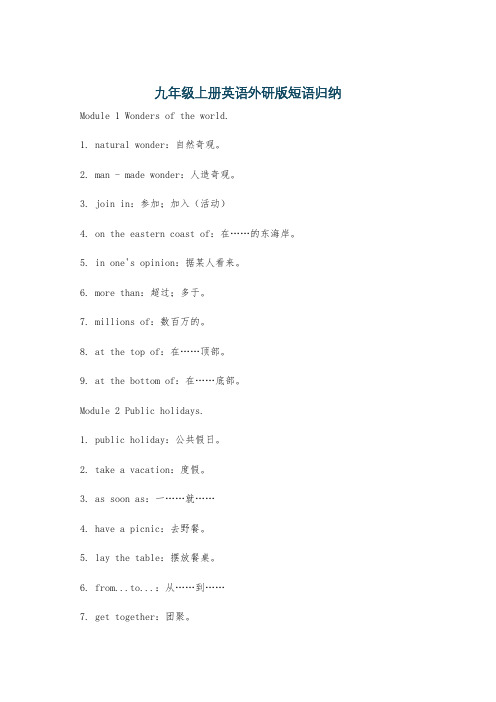
九年级上册英语外研版短语归纳Module 1 Wonders of the world.1. natural wonder:自然奇观。
2. man - made wonder:人造奇观。
3. join in:参加;加入(活动)4. on the eastern coast of:在……的东海岸。
5. in one's opinion:据某人看来。
6. more than:超过;多于。
7. millions of:数百万的。
8. at the top of:在……顶部。
9. at the bottom of:在……底部。
Module 2 Public holidays.1. public holiday:公共假日。
2. take a vacation:度假。
3. as soon as:一……就……4. have a picnic:去野餐。
5. lay the table:摆放餐桌。
6. from...to...:从……到……7. get together:团聚。
8. depend on:依靠;取决于。
Module 3 Heroes.1. be born:出生。
2. give one's life to (doing) sth.:为(做)某事献出生命。
3. stop sb. (from) doing sth.:阻止某人做某事。
4. both...and...:……和……两者都。
5. in the end:最后;终于。
6. make a speech:发表演讲。
Module 4 Home alone.1. look after:照顾;照料。
2. be careful with:小心(对待)……3. make sure:确保;设法保证。
4. plenty of:大量;许多。
5. wake up:醒来。
6. be about to:即将;正要。
Module 5 Museums.1. no entry:禁止入内。
外研版九年级英语上册Module-5-Unit-3知识点

Module 5 MuseumsUnit 3 模块语法-表“禁止做某事”的结构和if 条件状语从句(1)本模块重要结构:“禁止做某事”,多是祈使句,常用于公共场合警示语。
① Don’t +动原(+其他)Don’t cross that rope! 不要越过那条绳子! ② No+v-ing. No fishing. 禁止垂钓。
No swimming.禁止游泳。
No smoking.禁止吸烟。
③ No+名词. No entry. 禁止入内。
No photos. 禁止拍照。
No pets.禁止宠物。
④ 主+ can’t/mustn’t +动原(+其他)You can’t park your car here. 你不能在这里停车。
You mustn’t swim in the lake. 不能在湖里游泳。
(2021·湖北省黄冈市·月考试卷)—What rules do you have in your school? —_________ eat in the classroom.A. Can ’tB. Don ’tC. Isn ’tD. Doesn ’t【答案】B【解析】句意:——你们学校有什么规定?——不要在教室里吃东西。
此处为否定祈使句,Don ’t+动词原形。
故选B 。
if 当“如果”讲时,引导的从句是一种条件状语从句。
if 条件状语从句分为真实条件从句和虚拟条件从句。
真实条件从句适用于主将从现,是假设有可能发生的。
而虚拟条件从句是假设不太可能发生的。
虚拟语气是高中英语的重难点。
初中阶段我们只学习if 引导的真实条件状语从句。
知识精讲本模块我们学习的if条件状语从句结构是:“if条件从句+祈使句”,意为“如果……,就……”。
作为主句的祈使句,可以是肯定式,也可以是否定式。
此结构中的if条件从句通常用一般现在时。
✧If you ever go to London, make sure you visit the Science Museum.如果你去伦敦,一定要确保去参观科学博物馆。
九年级英语书上册外研版
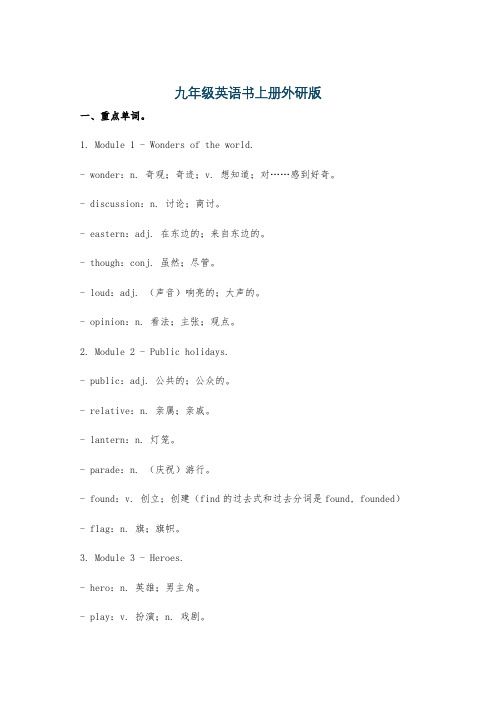
九年级英语书上册外研版一、重点单词。
1. Module 1 - Wonders of the world.- wonder:n. 奇观;奇迹;v. 想知道;对……感到好奇。
- discussion:n. 讨论;商讨。
- eastern:adj. 在东边的;来自东边的。
- though:conj. 虽然;尽管。
- loud:adj. (声音)响亮的;大声的。
- opinion:n. 看法;主张;观点。
2. Module 2 - Public holidays.- public:adj. 公共的;公众的。
- relative:n. 亲属;亲戚。
- lantern:n. 灯笼。
- parade:n. (庆祝)游行。
- found:v. 创立;创建(find的过去式和过去分词是found, founded)- flag:n. 旗;旗帜。
3. Module 3 - Heroes.- hero:n. 英雄;男主角。
- play:v. 扮演;n. 戏剧。
- fight:v. (fought,fought)与……战斗;斗争;n. 战斗;斗争。
- brave:adj. 勇敢的。
- ground:n. 地面;土地。
- lead:v. (led,led)领导;率领。
二、重点短语。
1. Module 1.- natural wonder自然奇观。
- man - made wonder人造奇观。
- in one's opinion按某人的看法;据某人看来。
- more than超过。
- at the top of在……顶部。
2. Module 2.- public holiday公共假日。
- as soon as一……就……- lay the table摆餐桌。
- on vacation度假。
- get together聚会。
3. Module 3.- give one's life to为……献身。
- in the end最后;终于。
- 1、下载文档前请自行甄别文档内容的完整性,平台不提供额外的编辑、内容补充、找答案等附加服务。
- 2、"仅部分预览"的文档,不可在线预览部分如存在完整性等问题,可反馈申请退款(可完整预览的文档不适用该条件!)。
- 3、如文档侵犯您的权益,请联系客服反馈,我们会尽快为您处理(人工客服工作时间:9:00-18:30)。
外研版初中英语九年级上册内容梳理一、目录二、知识梳理与中考考点总结模块1——Nature and travel 1、需掌握单词,31例题:英译中2、语法知识——六种时态1)一般现在时——并非表示现在一般现在时并非只表示“现在”。
确切地说:表示从过去到现在直至将来的一段时间内发生的动作或存在的状态。
也就是说,这些动作或状态的发生不限于某个特定的时间,它们可以发生在任何时间,包括现在、过去和将来,这一段时间可以近乎无限长(如表示客观真理),也可以是人们生活中的一段时间(如人们的习惯活动)。
一般现在时很重要,但中考出现频率低,一般做写作要求。
1、一般现在时的构成1.1Be(am/is/are)动词的一般现在时构成:主语+be动词+……/ Be动词+主语+…肯定句/否定句:He is a rapper. We are teammates. Actually, I’m an actor. I’m not the god of medicine. I’m not wrong.一般疑问句:Are you serious?/Yes, I am./No, I am not Are you ok? Is there a problem? Is this a test?1.2实义动词的一般现在时的构成:主语+(don’t/doesn’t)+动词原形/第三人称单数形式+… / Do/Does+主语+动词原形+…?肯定句: I often think of the past. He finishes his homework on time. I always spend many hours studying every day否定句: He doesn’t come to school. He doesn’t finish his homework on time.一般疑问句: Do: you want to kill Nazis? / No, I don’t want to kill anymore!Does she get up early every day? / Yes, she does. / No, she doesn’t.2、一般现在时的用法常用时间状语:often always sometimes usually every day on weekends never seldom once a week2.1表示现在经常性、习惯性的动作,My mother usually gets up at six in the morning.(牡丹江中考·适中)We make it a rule that each of us______ the classroom one day a week. A. clean B. cleans C. has cleaned2.2表示主语现在的特征或状态Tom has a good sense of humor. I like math very much.2.3表示客观事实、普遍真理、俗语等The earth goes around the sun. Actions speak louder than words Paris stands on the Seine Rivers.2.4一般现在时表示将来①表示按时间表拟定的或安排好到时候发生的事情或动作,通常有表示将来的时间状语。
常可以这样用的仅限于少数表示短暂意义的动词,如come, go, run, start, begin, return, leave, take place等The train leaves at six. The final exam takes place next week.②在时间和条件状语从句中用一般现在时表示将来,主句用一般将来时。
Ben will like he as soon as he sees her.(时间状语从句)If Bob stays away from the junk food, he will be in good health.(条件状语从句)(贵阳中考)2)一般过去时一般过去时表示在过去的某一个特定的时间发生和结束的活动或情况,在过去一个特定的时间所发生的动作或存在的状态,此时常和表示过去的特定的时间状语连用。
这些时间状语有:yesterday,yesterday,evening,last night,the night before last,last year/week,last spring,an hour ago,just now,the other day(前几天)以及three days/months/years ago等等。
注意:这些时间状语之前不需要加介词。
一般过去时还可以表示过去的一段时间内延续或重复的动作,但这一动作现在已结束。
1、一般过去时的构成1.1be动词的一般过去时:主语+be动词+(not)+……/ Be动词+主语+……She was born on a sunny morning. We weren’t at school yesterday. Was she angry just now? / Yes, she was./No, she wasn’t.1.2实义动词的一般过去时,一般用动词过去式表示:主语+(d idn’t)动词过去式+… / Did+主语+动词原形+…?I knew him three years ago. I didn’t get any tickets for Jay Zhou. Did you wash the bowels last night?/Yes, I did/No, I didn’t.2.一般过去时的用法2.1表示在过去确定的某个时间里所发生的动作或存在的动作The Avengers was popular last year. She didn’t go out last night, because she had a headache.(昆明中考·简单)Did you do anything interesting last Sunday?----Not really. I just ____ at home.A. stayB. stayedC. will stayD. am staying2.2表示在过去一段时间内经常性或习惯性的动作Tom went to school on foot last year.2.3叙述没有过去具体时间的动作或状态,有些情况发生的时间没有清楚表明,但实际上是过去发生的,应该用一般过去时Ken left his jacket in the gym. He has to get it back.Oh , how nice of you. I never thought(说话之前没想到,但现在已经知道了)you were going to bring me a gift.2.4表示过去将要发生的动作表示过去将要发生的动作,在时间和条件状语从句中,若主句用了过去将来时,从句常用一般过去时代替过去将来时。
We wouldn’t leave until she came back.(时间状从) he said she would come if she was free that day.(条件状从)3)一般将来时一般将来时表示将来某个时间将要发生的动作、存在的状态和将来经常、反复发生的动作,常与一些表示将来的时间状语或状语从句连用。
常用时间状语:tomorrow,in the future,soon,before long,this afternoon,next time,from now on,next year/month1一般将来时常用结构1.1“will/shall+动词原形“表示将来,用于表示“主观上势必发生的事或临时做出的打算”,shall一般用于第一人称,will可用于任何人称I will come back soon. From now on I will/shall come for the newspapers every Monday.1.2”be going to+动词原形“表示将来,用于表示说话者主观计划、打算或安排要做某事,或根据某种客观迹象预测某事即将发生。
I am going to supermarket tomorrow. It’s going to be a fine day tomorrow.1.3”be to do ”结构表示按计划、约定、职责或义务必须去做的事。
The kids are to go school next week.1.4”be about to do”结构表示客观上马上就要发生的事,不与具体的时间状语连用。
Don’t go out. We’re about to have dinner. She is about to leave for Shanghai.1.5一般现在时表将来,见上面内容1.6现在进行时表将来,见下面内容4)现在进行时现在进行时是英语中使用较多的一个时态,尤其在口语中频繁出现。
完整的现在进行时语法有6中用法,第一,也是最典型的用法是表示在说话的时刻正在进行的动作;第二,表示现阶段正在持续的活动,这时表示,的是一个一般性的活动,在说话时刻这个动作并不一定正在发生(通常都不发生),而是在目前一段时期内持续的一种暂时的情况;第三,用于表示“改变”的动词,表示现阶段逐渐变化的过程。
常见的表示“改变”的动词有:change,come,get,become,grow,deteriorate(恶化)等;第四,在英文的日常口语交际中,我们要表达自己的各种强烈的感情,比如生气,激动和兴奋等等,我们往往会频繁使用现在进行时;第五,现在进行时在口语中还经常用来表示将来的动作,此时的现在进行时是表示在说话之前就确定的、计划好的将来的安排;第六,与always,forever,continually,constantly等连用,表示多次重复的行为,且含有感情色彩。
这种反复是积极的、让人喜欢的事情。
1、现在进行时的构成:主语+am/is/are+现在分词Listen! She is singing songs. They aren’t playing basketball now.Are the children flying kites in the park? / Yes, they are. / No, they aren’t.2、现在进行时的用法2.1表示说话时正在进行的动作或存在的状态Look,Sam is watching TV happily on the sofa.May I speak to the headmaster?-----He is having a meeting now. Can I take a message?2.2表示现阶段正在进行的动作,但此时此刻该动作不一定正在进行David is learning Chinese in Beijing.等非延续性动词。
